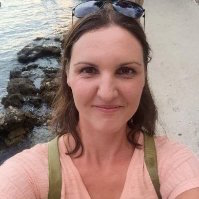
When you ask yourself the question, “Do you feel fulfilled or empty inside,” what would be your response?
So many of us are waking up with a severe case of existential anxiety and feelings of “What’s the point?” and “Why do I feel empty?” But where is it really coming from?
When we feel empty inside—it is likely we might end up in co-dependent relationships with people, the bottle, with bad habits, excessive spending patterns and with money. It is like we can never get enough of the supply—but the supply itself is like a poison to ourselves and will never give us the fulfillment we crave.
Throughout my life, especially in my 20s, I had moments in which I would feel quite empty. I used to think it was because I needed another person to “complete me” or that I needed to find an occupation which brought me recognition and a sense of having accomplished something in life. When I look back, I know that things would have been different had I known more about self-worth and how to cultivate it. I also know that my issues with co-dependency greatly contributed to my sense of self-loss.
Philosopher Alan Gewirth talks of the modern ideal of self-fulfillment as being something that: carries to fruition one’s deepest desires or one’s worthiest capacities. It is a bringing of oneself to flourishing completion, an unfolding of what is strongest or best in oneself, so that it represents the successful culmination of one’s aspirations or potentialities. In this way self-fulfillment betokens a life well lived, a life that is deeply satisfying, fruitful, and worthwhile… (and is opposed to) self-defeat, self-frustration, self-alienation, and self-destruction.
So in some ways the idea of self-fulfillment carries forward the idea of finding (and seeing) the “best” in ourselves, working toward our potential in order to culminate and actualize our dreams.
We all have dreams and passions, whether we have managed to actualise them or not. I think to know the value of your passion or dream, is akin to understanding your self-value which will ultimately lead to reaching self-fulfilment. For some it may be writing that book that you had always wanted to write, tapping into our creativity a little more, or simply helping people and feeling a sense of reward and fulfillment from not asking for anything in return.
Over the years I had forgotten myself and my self-worth.
I was in a relationship that I had ended up in due to issues with co-dependency. My partner and I both mistook things like possessiveness and jealousy to mean love. We created our own isolated and sometimes destructive world to the point that we only had one another, and we clung to one another—we clung hard.
Perhaps we both lacked self-esteem, self-worth and were constantly living in a state of self-defeat, so we comforted and complimented one another—maybe because we were both empty. We spent every single day together and started a business in which we could literally be together all day. But I don’t think the business fulfilled either of our yearnings and life goals as we were basically stuck in a routine that we had memorized—living a life that made me at least wake up on so many mornings and say to myself “there has to be something more.”
Of course, there were times when life was good—we had a generous amount of money, expensive cars, and were often living in beautifully scenic locations—we even had three wonderful children from my partner’s previous marriage. We worked hard but we lived in a state of excess and oblivion to our own internal problems. It was as if we were feeding our souls the wrong food.
So we clung harder to each other, expecting one another to do what neither of us could do: love ourselves.
The result of being so close ended up with me doing something I could not forgive myself for—isolating myself completely from my friends and family and allowing my partner to be my world, in fact, I isolated myself so much that I had not seen any of my friends or family for five whole years.
The emptier I felt, the more I would sink a little deeper into the “paradise” we created, until I no longer resembled even a trace of my old self. I caved into my partner’s wants and needs in order to create a sense of happiness and peace. I did not realize that by ignoring myself and by ignoring my own wants and needs, I was not only abandoning my friends, family, my own life, I was also abandoning my soul and completely forgetting my self-worth. And it’s hard to believe, but I did have dreams—I had goals and aspirations—but I had forgotten what they were along the way.
After the relationship ended, after I had moved on, sorted through the mess and dedicated myself to rebuilding the foundations of my own life, I realized that the last few years and in fact the last few decades of my life, I had felt empty on more occasion than I had felt fulfilled. This pushed me to think more about the state of myself—the state of my soul—the thing inside that has the capacity for true growth if we cultivate its happiness by filling it with the right sort of things.
How easy it is to fill the hole inside us, or even mask it with things like food, alcohol, drugs, sex, approval, relationships, transient encounters, new cars, technology, money etc. It is so easy to feel instant gratification, but the emptiness always returns.
So what then are the things that offer us fulfillment?
Actually they are quite simple to understand but take some time and perseverance to achieve. Knowing the value of your dreams is akin to knowing your self-value, the pleasure of giving not to receive, to offer advice without judgement, to love without fear—to love without possessing or limiting another.
Self-fulfillment is achieved by not forgetting ourselves, by listening to our soul in order to find out what sort of food it craves; and then feeding it.
Don’t feed it the things that are readily available just because they are there, sometimes you really have to search inside yourself to find out what you are really craving. Sometimes it takes a long time of sorting through the bad experiences to get to the good experiences.
The most important lesson I think is learning to acknowledge our flaws and shortcomings. To look at ourselves with complete honesty, and realize that we are not perfect but that if we persevere with mindful determination, we can truly change for the better. It is so easy to look at the past and be wracked with guilt for all the things we did wrong and think about all the things we wished to have done differently. But this sort of self-defeating attitude works to beat us down and not free us. Forgiveness of ourselves and others is true freedom and the true road to fulfillment.
Relephant:
5 Ways to Kick-Start our Self-Esteem Recovery.
~
Author: Barbara Conrad
Editor: Catherine Monkman
Photo: Joana Coccarelli/Flickr

 Share on bsky
Share on bsky


Read 0 comments and reply